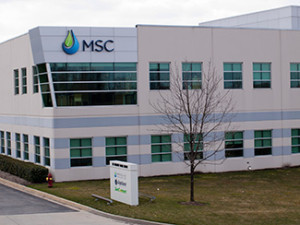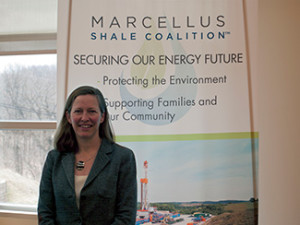Pamela King, E&E reporter
PITTSBURGH – For companies looking to break into the natural gas business here, a Marcellus Shale Coalition membership is key.
Four years ago, MSC was little more than an informal umbrella over a smattering of energy companies exploring the Marcellus Shale’s potential to yield natural gas. Today, the industry group is a 300-member, five-office powerhouse that has made itself a household name in the region that birthed the U.S. natural gas boom and brought new wealth and prosperity to drilling communities. It counts Marcellus drilling giants like Chesapeake Energy Corp. and Cabot Oil & Gas Corp. among its members.
Because of its unusual setup — MSC’s focus is on companies operating in a particular energy play, rather than in a certain state — the coalition has extended its reach to residents and industry in not only its home base of Pennsylvania, but also West Virginia, Ohio and New York.
“From the beginning, we knew that outreach and education would be important,” MSC CEO Kathryn Klaber said.
Klaber, a native Pennsylvanian who answers to Katie, is the coalition’s first CEO. Unlike many of her peers at other energy industry groups, she didn’t come from the energy business.
Before joining MSC in 2010, Klaber was executive vice president for competitiveness at the Allegheny Conference on Community Development, executive director of the Pennsylvania Economy League and an employee of consulting firm Environmental Resources Management Inc.
Klaber called those roles a “good prequel” to the work she’s doing with MSC because those jobs exposed her to the economic challenges Pennsylvanians face and the health, safety and environmental rules to which local businesses must adhere.
As MSC CEO, Klaber, 47, works closely with the organization’s executive board, listening to members and attempting to execute their priorities. Over the organization’s four-year existence, that has become an increasingly onerous task as the group’s membership has grown from about 40 to 300 companies, running the gamut from oil and gas producers to local businesses that are providing support services for Marcellus Shale development.
“This is not your grandfather’s trade association,” said MSC spokesman Travis Windle.
The supply chain integration model is one that is increasingly popular among energy industry groups, including MSC’s sister organization, the Colorado Oil and Gas Association.
COGA President Tisha Schuller, who came into her post around the same time Klaber joined MSC, said she’s been impressed with the coalition’s reach.
“In just a couple years, it’s like they’ve been around for decades,” she said.
Schuller added that Klaber’s role in the coalition has been critical to its success.
“Katie Klaber is a really dynamic and strong leader, and I’m really impressed by her,” Schuller said. “She has quite a unique skill set and is positively a force to be reckoned with.”
‘Connectors’
Because MSC’s 15 staff members are spread across five offices and spend a lot of time in the field, coalition headquarters, located on a winding road in a business park near Pittsburgh International Airport, is far from bustling.
But its phone lines are busy.
For the people who call in to ask questions such as “Where’s my royalty check?” or “How can my son get a job?” Klaber said MSC’s staff members see themselves as “connectors” who can provide critical information.
Windle offered one example of a call that came into the office in late March.

Meetings at MSC’s Pittsburgh headquarters provide key networking opportunities for energy companies and support service providers.
“I spent probably 45 minutes on the phone with a nice older woman from the Youngstown [Ohio] area, and she had questions about seismic, and she was calling the ‘Marcellus Shale.’ People might say, ‘I hear Marcellus Shale, I read about it in the newspaper; I’m going to Google that,” he said. “Who comes up? We do.”
In the case of community members worried about the health, safety and environmental impacts of drilling and hydraulic fracturing, the technology used to extract gas from shale, MSC often arranges rig tours.
“Those tours are the best way to really have a more productive conversation because you see how this works,” Klaber said. “You see how complex it is.”
She said she only wishes she could get all 12.7 million Pennsylvanians on a tour.
While public questions aren’t MSC’s focus, part of its role is to engage and educate the wider community to help the industry operate more efficiently, Klaber said.
How does the coalition do it?
“Just like the energy strategy: all of the above,” said Steve Forde, MSC’s vice president of policy and communications.
Using YouTube videos, speakers series, an online Ask About Shale forum and other techniques, the coalition has attempted to reach every corner of the region affected by Marcellus activity.
Forde said he was surprised by the success of a recent 11-minute YouTube video explaining methane migration.
“To register as a YouTube hit, you’ve got to watch it the whole way through, and even I didn’t make it through the first couple of times. But in the first week, we had like 1,100 full views on something that’s very, very technical,” Forde said.
Klaber added that the video’s popularity demonstrated a hunger for information about drilling.
“We thought, ‘Wow, people really do want to learn,'” she said.
Environmental debate
To some in the environmental community, though, MSC’s methane video and other educational materials are a form of industry propaganda.
Jeff Schmidt, director of the Sierra Club’s Pennsylvania chapter, was critical of MSC’s support of a part of Act 13, the 2012 Marcellus Shale drilling law that says state regulations supercede local authority to control gas operations. The coalition and other industry groups say they oppose local regulation because of its fragmented nature. Businesses need consistency to operate effectively, they say.
“The coalition’s goal is to change the subject from the problems and simply focus on economic benefits,” Schmidt said.
Klaber said the coalition has worked to take a proactive role in Marcellus Shale issues and tried to withhold from fighting tooth and nail against new rules and regulations.
Pennsylvania Department of Environmental Protection spokesman Kevin Sunday said MSC has been instrumental in industry communications. When Gov. Tom Corbett (R) two years ago called on the oil and gas industry to stop sending its waste to facilities discharging into waterways, DEP reached out to the coalition.
“We called on the industry and particularly the MSC,” Sunday said. They “complied overnight.”
Through its committee structure and monthly meetings, MSC gives its board members — producers and midstream companies — and its associate members — the legal experts, environmental consultants, road repair professionals and others who facilitate the drilling process — the chance to collaborate on best practices for oil and gas extraction in the Marcellus.
Associate member Accutest Laboratories, an engineering consulting firm, was involved in recent recommendations for companies to conduct pre-drilling groundwater sampling near wells to provide a base line for comparison in the event of later pollution allegations.
“[MSC takes] a proactive role in what I’ve seen in determining any issues or addressing any part of it,” said Accutest Technical Director Kesavalu Bagawandoss. “They want to make sure the right things are done in a responsible manner.”
The coalition’s best practices are the heartbeat of the organization’s efforts to push member companies and even energy firms outside its membership to go above and beyond state drilling regulations.
“This is a challenge across lots of businesses, but ours in particular, that we have allowed ourselves as a business community to come across as not environmentally sensitive where it’s the exact opposite,” Klaber said. “There’s more protection of the environment happening from within the varied industries that design and build and operate these processes. You look through our membership roster, and there are more engineering degrees and civil and environmental and chemical — all the technical aspects that make sure we do this in a protective manner.”
But the best practices supported by MSC and other oil and gas industry groups don’t hold operators accountable, allowing them to pick and choose to what extent they would like to protect the air and groundwater, said PennEnvironment spokeswoman Erika Staaf.
“From what I see, the main point that they try to drive home is related to economy and jobs because they see that it’s a strong argument they can make,” she said. “It seems to me they might minimize the environmental dangers.”
Staaf added that greater support from the coalition on environmental regulations could “raise the basement rather than just the ceiling” for the industry.
MSC’s future
With the environmental debates and price issues — natural gas recently began a slow price recovery after overproduction forced rates to 10-year lows — surrounding Marcellus Shale development, Klaber said she sees the industry as one that is very much in flux.
Although MSC plans to keep its play-specific name, the staff there sees a role for itself in guiding development in Ohio’s Utica Shale and other emerging energy fields in the region. Still, Klaber said she wants to keep the coalition’s focus on the Marcellus, where she believes there will be work to do for years to come.
“If we keep chasing the next shale play, that’s all we’ll be doing,” she said.
Despite some safety and environmental concerns, the public is still largely interested in how it can stake its claim in shale prosperity, Klaber said.
“As that awareness of that opportunity has grown, different agencies see a role for their own missions in it,” she said.
Fostering that interest is part of MSC’s future.
“We realize that as people go along that education curve, the support level goes up. But Pennsylvania is 12.7 million people, and it takes 45 minutes to talk to one woman about seismic in Ohio,” Klaber said, hearkening back to Windle’s call.
“It’s not going to happen overnight.”
NOTE: Click HERE to view this story online.





